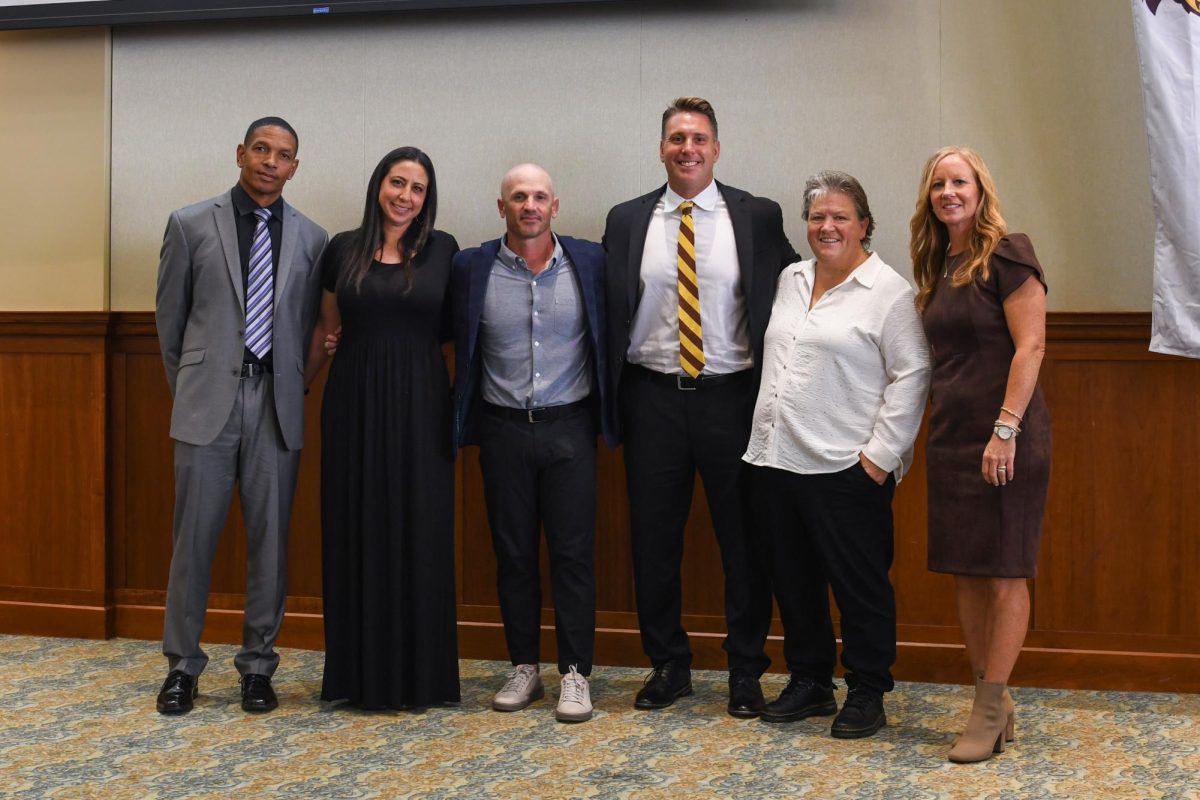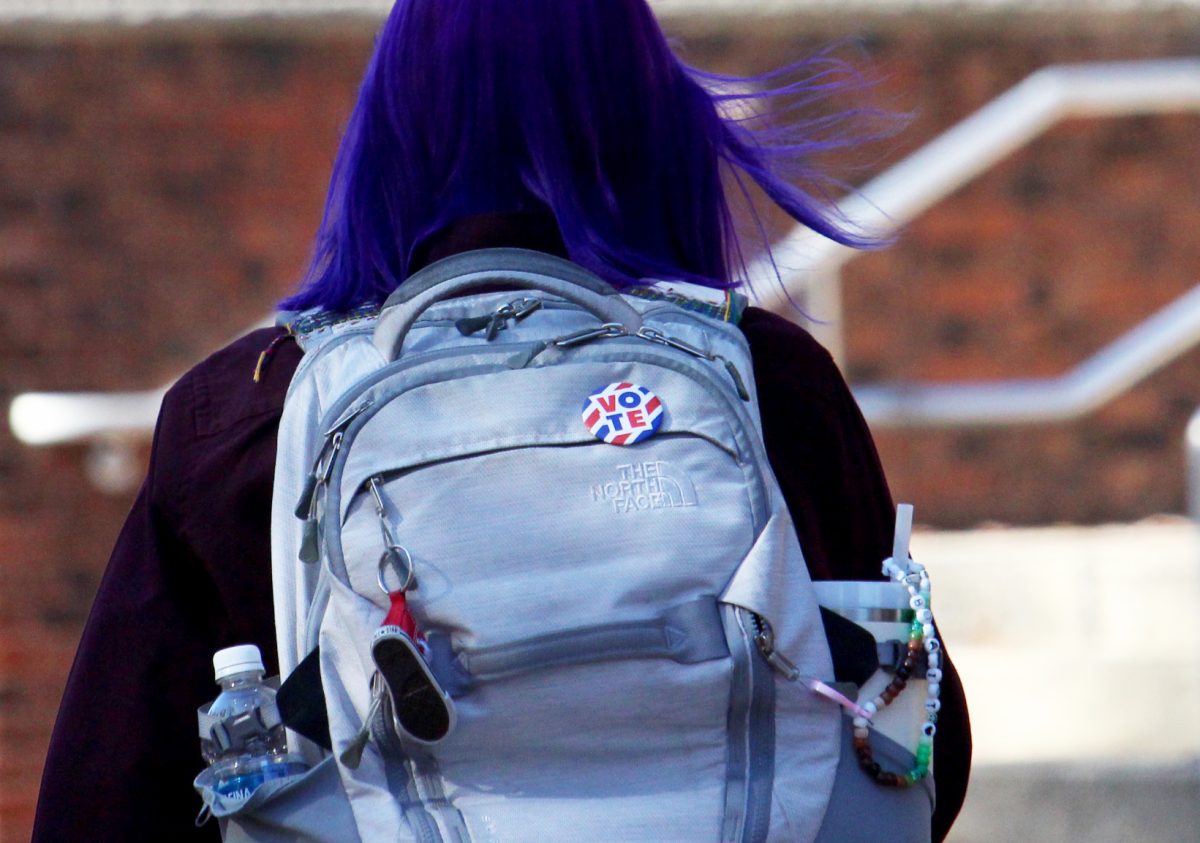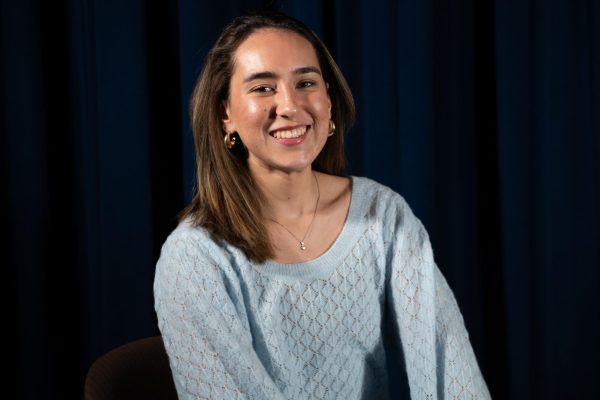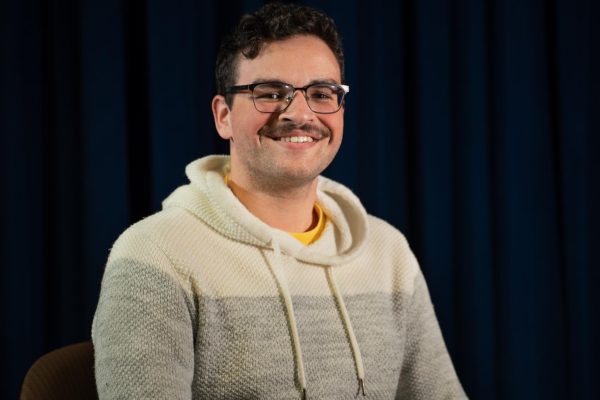Americans took to the polls on Nov. 5, casting their votes for local matters, state officials and senators, and the highly anticipated decision of who to elect as the next President of the United States. Candidates, Vice President Kamala Harris, and former President Donald Trump went head-to-head in a close race, making this a divisive, and emotional election for people all over the country, regardless of political affiliation.
As states counted millions of mail-in, early, and in-person ballots, AP News declared that former President Donald Trump has officially been elected as the 47th president of the United States this morning. After losing to President Joe Biden four years ago, Trump won the election with 277 electoral college votes, according to AP. As for New Jersey elections, Andy Kim defeated Curtis Bashaw in the New Jersey election for senator, making him the first Korean American to be a senator.
For many Rowan students, the election was the first time they’ve been able to make their voices heard in a way that they hadn’t been able to before, by voting and participating in the democratic process. For some, this was their first election, as they are newly 18 or hadn’t turned 18 before the 2020 decision. Student journalists, like the ones at Rowan Radio, 89.7 WGLS FM, even got to share their voices with the community, providing listeners with real-time, objective coverage of the local and national news as it came in.
Just outside of campus at the Glassboro Municipal Building, residents and registered students took to the polls to make decisions about national issues but also issues that directly impact the Glassboro community. With two non-binding ballot referendums about a proposed rerouting and bypass of 322, as well as a light rail that would run from Glassboro to Camden, there were decisions to be made that went beyond political parties or campaigns.
As a university that has been growing and developing for over 100 years, there was a wide range of experiences and perspectives in the borough on this important day.
Rowan students exercise their right to vote
The 2024 presidential election was their first time voicing their opinions at the polls for many in Rowan’s student community. Some voted early, some by mail, and some even hit the polls after their afternoon classes. Some on-campus organizations, including the Rowan Progressives and Rowan Votes, even sat outside with tables, available to answer questions and provide students with voting information and resources.
Among these students was Amity Briggs, a senior history education major who is also a part of the Rowan Progressives. The group tabled outside of the Prof Statue in the center of campus, where they hosted a bake sale, and got to chat with students on their way to classes. Briggs voted early and encouraged other students to exercise their civic duty to decide the future, especially in their community. However, she also explained that voting isn’t the only way, or most important way to build the future they want to see.
“Local elections are the most important elections, that’s what I would say first and I would say also that voting is, this is a bit controversial but I think it’s the least important part of a democracy. I think the most important part is getting out there and building change. So, democracy doesn’t end today with voting, it continues every day of every year,” said Briggs.
She also empathized with the feelings that some students may have about the presidential candidates, explaining that students may not be “happy with the choices that we have.” Despite this, she advises them to take action, catalyze change, and have a vision for the future that goes past the polls and voting results.
“If we want to build change, we have to look for the future and not just think about the election day. We need to think about how we’re actively changing society so we can have candidates we’re actually excited about, not just voting because they’re there,” said Briggs.
For freshman student, Anthony Malesich, this was the first time voting in an election, as he recently turned 18. A South Jersey native, Malesich traveled to his hometown, located not too far from Rowan’s main campus to vote after his classes.
“It’s important for people our age to get their voices out, this is the first time for us to have power in our government. So, our choices do in fact matter on who they vote for and what they want,” said Malesich.
Further down the road outside of the Glassboro Municipal Building, students taking professor Tim Hawk’s photojournalism class were interviewing and photographing voters, asking them questions, and capturing the Glassboro election through a lens. As voters trickled in and out of the building, they were able to capture voters who took to the polls in the late afternoon.
“It’s a little bit hard for election day because people are coming in and out really fast but it’s pretty fun,” said Aliyah El-Muhammad, a junior majoring in journalism.
Isaac Linsk was another student who spent the day out in the field capturing everything on his camera. He hadn’t anticipated having an election-related assignment in class, but because of morning classes being canceled, he had some extra time to walk around and see what the campus climate was like. His findings were that the hustle and bustle and excitement for the election in both his hometown, Atlantic City, and in Glassboro was not necessarily what the many major media organizations played it up to be due in part to the fact that many New Jerseyans have access to alternative voting methods than hitting the polls on election day.
“I walked around from about 11 to 1 today getting some different shots. It was interesting because I think New Jersey has large access to early voting, vote by mail, and things like that. The whole hubbub of election day isn’t as exciting as it might be in places like I don’t know, Pennsylvania or other swing states, or at least in a big city,” said Linsk. “I’m sure in Newark or Jersey City they’ve got lines out the door of places, but at least when I went around even Atlantic City this morning before I drove up to campus, obviously I saw people coming in and out but there wasn’t a ton of excitement about it.”
Glassboro polls bring students and residents together to make a decision
Not only did Glassboro residents vote to elect the next president, but they also had some local issues presented on their ballots. Particularly concerning the 322 bypass proposal and the Glassboro Camden line, two highly controversial projects that have been talked about by local government for years.
After polls closed, NJ.com reported that the 322 bypass referendum closed with a final vote of 3,410 votes for yes, and 3,659 votes for no. The Glassboro Camden line project closed with a final vote of 3,819 votes for yes, and 3,270 votes for no.
Rebecca Nichols, Glassboro resident and homemaker, has been a resident and voter in town for years and explained that when she goes to vote, she makes her decision based on what’s best for her family. When it comes to the ballot referendums, she was not in support of either project but felt a sense of powerlessness speculating that the projects would ultimately be up to those spearheading them, regardless of the way she voted. She fears that if 322 is bypassed the way it’s been proposed, connecting with Ellis Mill Road, traffic safety will become an even more contentious issue than it already is.
“I don’t want to see 322 right here,” Nichols said, gesturing to High Street. “It’s already enough traffic, my husband’s already almost been hit twice at this intersection walking down to the municipal building from our house a couple blocks away… aside from the fact there’s no turn lights at this intersection and it is awful to turn at.”
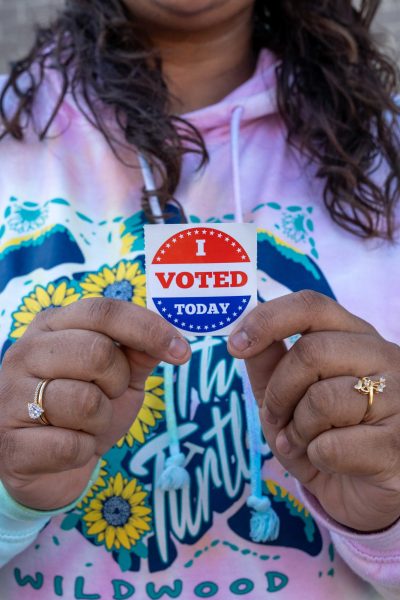
Resident David Corkum, a warehouse manager for a pet pharmacy has been living in town for seven years. He sees the pros and cons of the railroad project, but when it comes to the bypass, he’s directly affected by the route at which it would take.
“As far as the 322, I live in the development that it would affect so I definitely don’t want it. So, that’s just me personally but I see the pros behind [the project], the students literally have to walk across this road every day and it’s a problem for them too so I get it,” Corkum said.
Zach Wolfe, 29, is a veteran and bartender at student hotspot Landmark Americana, as well as a Rowan Radio/TV/Film senior. He spent years in the military doing digital journalism. In the 2020 election, he cast his ballot via mail because he was still overseas, but this time around was able to fill out a ballot in person. He hadn’t heard about the Glassboro Camden railroad project until he cast his vote but personally doesn’t think it’s something that’s necessary for the town.
“It’s not like the drive is two hours, I don’t know how incredibly necessary it is in my opinion, so I don’t know I wasn’t super crazy for it, just cause I think it’s going to make everything more and more congested, potentially. But I also don’t go to Philly or Camden at all so I don’t really have a stake in that race, I guess,” said Wolfe.
As a veteran, voting is something that is of the utmost importance to him. Now more than ever, he thinks that young people are impacted by and need to participate in political issues in order to make a real change.
“I’d feel like I wasted my time in the service if I don’t come out and vote and do my part. And especially now things are getting to a point in the country and in the world where, especially for younger people, we’re much more affected by everything every year and what happens every election,” Wolfe said. “Whereas, I think even compared to when I was a kid, a lot of that stuff just seemed to go over your head. Now as I’m getting older I see how that really does trickle down now and it affects everyone.”
Rowan Radio hosts a three-hour live broadcast providing students with hands-on experience
After the votes were cast, a group of student journalists on Rowan Radio, or 89.7 WGLS FM, participated in their first-ever three-hour-long live broadcast on election night. From 8 p.m. to 11 p.m. sports communication and media, business, and journalism majors all came together in Bozorth Hall to partake in what Assistant Station Manager, Leo Kirschner described as a “three-hour long sporting event” comparing it to broadcasts that the station does regularly.
The broadcast was intended to inform listeners about not only the national race but also what’s going on in local and state elections. Even though WGLS is located in Glassboro, the broadcast reaches people throughout the tri-state area, including Delaware and crucial swing state Pennsylvania.
“All broadcasting, particularly with radio, you have to serve your community, so we’re serving our community by letting them know what’s going on from a community perspective. So not only are we just talking about the presidential election, we’re also going to pay particular attention to the races in New Jersey, Pennsylvania, and Delaware because WGLS’s signal carries those three state areas,” said Kirschner.
In the past, students have covered election night, but never in this fashion. In years prior, there would be small increments of coverage, sprinkled in with the regularly scheduled music playing on the radio. Kirschner along with Station Manager Derek Jones have been wanting to tackle something like this for a long time and decided to take on the project beginning the preparation with students a little over a month before election night after seeing how many students were passionate about this election, and covering it.
The coverage included an interview with a Fox News contributor, a county administrator from Salem County came on to explain the voting process and how mail-in voting in New Jersey works, and Professor Benjamin Dworkin talked about Rowan’s Institute for Public Policy and Citizenship (RIPPAC).
“We wanted to outline, ‘What were the specific issues that affected the students?’ We have a team of students who decided to go out and do man-on-the-street interview packages so we have a number of those produced. There were also some people we wanted to have the students interview that had unique insight through professional connections between us and the university,” Kirschner said.
The coverage was fast-paced and broadcasters had to move like a well-oiled machine. By 8:40 p.m. the broadcast had already featured thirteen different segments, with two network newscasts, two on-air segments, two breaks, one of which had a sponsor, two clipped interviews, two man-on-the-street interviews, and three segments by Sports Director Aidan Dougherty.
Dougherty is used to calling live sporting events, but couldn’t pass up the chance to cover the election. As a senior sports communication and media major, his main career aspiration is to work in sports but he’s open to any opportunity that comes his way, even if that’s a job in the news.
“It’s challenging, right, and as somebody that wants to work in sports I mean, if there’s ever an avenue in news I’m not saying no. And I think it will make my life [better], whether I want to be a journalist or a broadcaster. If I can do this and I can also do sports, I think it opens up the avenue,” Dougherty said.
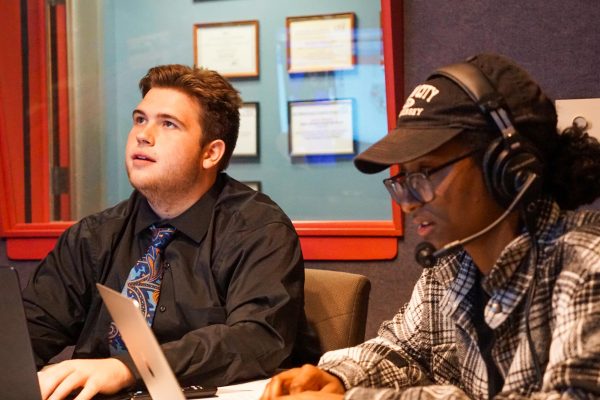
Since the broadcast was live, students prepared notes and information but were making calls about votes as they were coming in. Dougherty described the “reading and reacting” as the most exciting part of the night.
“The most exciting part I think is just reading and reacting. Right, I mean early on so far, Kamala Harris in Virginia was taking the lead [and] in North Carolina and that’s a big state. And then it flipped right back and we were like, ‘okay maybe we got a little bit too happy,’ not happy but too excited saying, ‘Oh is something brewing here?’” said Dougherty.
Dougherty took on the task of reporting national news along with colleague Leah Thorpe, a sports communication and media junior who aspires to go into the production and editing side of broadcasting. Her favorite part of the night was watching the results while being able to cover them alongside her peers.
“My favorite part has definitely been being on the air alongside Aidan, just being able to see the results going up live on the TV and then on my computer, and just being able to feed off of each other and bounce back and forth about what’s new. It’s kind of like a performance thing so it’s really fun to just let people know what’s changing,” said Thorpe.
The broadcast concluded at 11 p.m. and while the show won’t be uploaded online after the fact, listeners who weren’t able to tune in will be able to hear the pre-recorded long-form interviews which will be released as podcasts. Even as the night concluded, and final results were locked in, the memories and experiential learning that students were able to get is something that Kirschner hopes stays with them long after the polls close.
“Everything is experiential learning, everything is hands-on learning. We can talk about it in the class, we can talk about it in the studio, about how to do it but it’s events like these that you’re actually going to learn something and you’re actually going to create memories,” said Kirschner.
For comments/questions about this story DM us on Instagram @thewhitatrowan or email [email protected]















